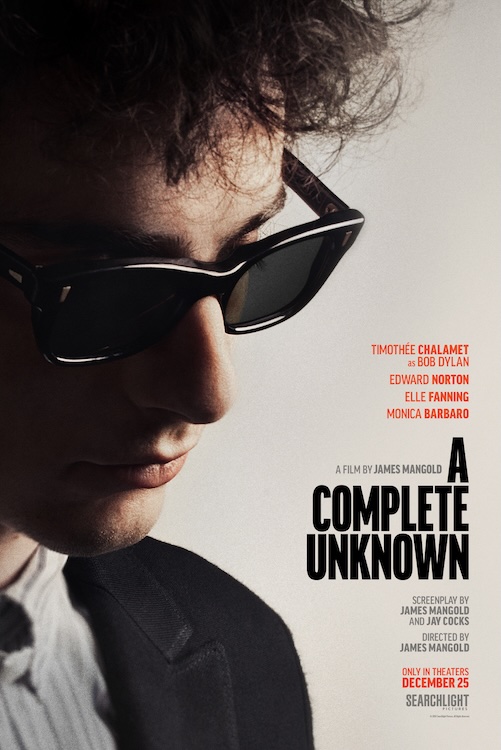No stranger to the musical biopic, director James Mangold previously tackled the story of Johnny Cash with Walk the Line (2005), and approaches subject of A Complete Unknown with a bit more reverence than in was afforded in the previously mentioned film – albeit with understandable reason. But what works most profoundly this time around is that the subject is treated simply as an extremely talented singer/songwriter and not a “god-like” figure that similar stories may have used as their way into the lives of their subjects. This isn’t exactly a “warts-and-all” type of story, rather it is the tale of someone who just happened to become Bob Dylan (if that can be referred to as something simple).
Mangold’s approach, along with co-screenwriter Jay Cocks, here is to tell a straight-forward type of story that follows Dylan’s somewhat meteoric rise within the world of folk music to become an icon of his own ilk and legend at the same time. The film culminates with Dylan’s “electric” performance at the Newport Folk Festival in 1965 that signified the end of one era and the beginning of a new one – the film is based on the book Dylan Goes Electric! Newport, Seeger, Dylan and the Night that Split the Sixties by Elijah Wood. This approach to the story allows the influence of the outside world at the time to be felt naturally within the confines of the narrative instead of being force fed to the audience via a long-winded bit of dialogue or newsreel footage that other films have resorted to, which allows the dynamic of the film to unfold organically and showcases Dylan’s creative growth as a sign of the times and therefore more intrinsic to the story.

Timothée Chalamet in “A Complete Unknown.”
Other aspects of the film also tackle the story from a matter-of-fact angle as the cinematography of Phedon Papamichael is almost classical in its straight-forward depiction of the folk scene in New York and the portrayal of events that shape Dylan’s metamorphosis into who he seems destined to become. The similar approach that Andrew Buckland and Scott Morris bring to the film’s editing also lends to the “classical” story telling involved here. The film isn’t a love fest that fawns over the brilliance of its subject and that makes it all the more entertaining.
As Dylan, Timothée Chalamet shines and practically guarantees the film at least one Oscar nomination for his work. Similarly, Edward Norton’s portrayal of Pete Seeger is equally impressive and immersive. Elle Fanning and Monica Barbaro as Dylan’s love interests Sylvia Russo and Joan Baez do an admirable job of stealing the spotlight from Chalamet when they share scenes with him. That type of character depth only adds to the layers within the film and its story.
More of a straight-forward snapshot of a period of time in Bob Dylan’s life than a career-spanning biopic, A Complete Unknown somehow still manages to capture the breadth of the artist’s importance to the world of music and the culture of the 1960s while simultaneously remaining a thoroughly entertaining and engaging film.

| Producer: | Fred Berger, Bob Bookman, Timothée Chalamet, Alan Gasmer, Alex Heineman, Peter Jaysen, James Mangold, Jeff Rosen |
| Release Date: | December 25, 2024 |
| Running Time: | 141 minutes |
| Starring: | Timothée Chalamet, Edward Norton, Elle Fanning, Monica Barbaro, Boyd Holbrook, Norbert Leo Butz, Dan Fogler, and Scoot McNairy. |
| User Rating: | |
| Writer: | Jay Cocks, James Mangold |
| MPAA Rating: | R (for language) |
| Director: | James Mangold |
| Distributor: | Searchlight Pictures, Walt Disney Studios Motion Pictures |
| External Info: | INSTAGRAM / #ACompleteUnknown |

